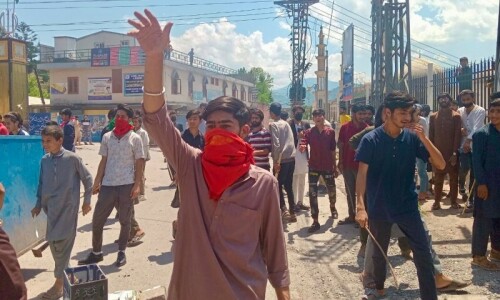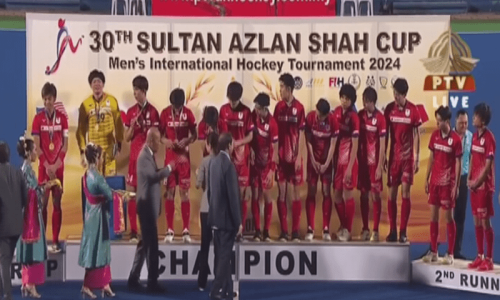UPON assuming his new position as the top judge of the Supreme Court, Chief Justice of Pakistan Qazi Faez Isa has set out at a rapid pace to execute his judicial vision. He called for a full-court meeting, constituted a full court to hear a contentious matter, and with the support of his fellow judges, had its proceedings telecast live.
In the meantime, CJP Isa also began consultations with the two senior-most judges after him, in relation to bench formations. Eventually, and subject to certain caveats, the law requiring such consultation was declared lawful.
However, despite the swiftness with which these steps were taken, it may be appropriate to observe that the CJP’s tenure, in fact, begins now. With the full court hearings out of the way, many will be evaluating how the CJP handles the various challenges afflicting the judiciary.
Undoubtedly, the CJP’s seat has always faced challenges, with expectations of straightforward redressal of pressing judicial issues on the one hand, and calls for judicial restraint on the other. But what are these pressing issues? There are many, of course, but a few come to mind as particularly urgent.
The first of these relates to the very image of the judiciary itself. On account of the controversial manner in which the Supreme Court has handled matters in the past, there is a perception that the Supreme Court shall always be beholden to the personal likes and dislikes of certain senior judges.
In essence, the perception is that the ideology and political inclinations of senior judges may influence the business of the Supreme Court in a way that favours a particular outcome, result, or scenario. Such perceived partisan conduct would not only damage the credibility of the judiciary, it would also remove any semblance of impartiality or neutrality in the institution.
In these polarising times, the CJP should be a uniting force for the judiciary.
Many may recall how cases related to Nawaz Sharif or Imran Khan would coincidently, it seems, find themselves fixed in court and even decided in record time, whereas others were not.
In fact, many have questioned as to what criteria had allowed certain political cases to be fixed and decided first, whilst cases in relation to the constitutionality of the law relating to DHA Quetta, or the legality of the Army Act trials, amongst others, were not. It is also pertinent to ask about the basis of Aasiya Bibi’s case fixation and decision, whilst similar cases, including that of Junaid Hafeez, are yet to be decided.
The science around case fixation has not been well explained, and it is precisely on account of this that repeated allegations of partisanship have been raised.
Therefore, either the method should be disclosed, and thus made more transparent, or if the mechanism itself is flawed, then the processes involved must be overhauled, improved, or replaced in a manner in which they are not beholden, or seen to be beholden, to any one or another individual.
Secondly, one hopes the chief justice will seek to finally settle the controversy surrounding the mode and method of appointing judges to the Supreme Court. Throughout the appointment process, Justice Isa, as he was then, had championed the formulation of criteria for appointments, and in its absence, for the seniority principle to be followed. With him now at the helm, it is time to finally evolve those criteria, preferably containing multiple factors, and with consultations with all stakeholders, so as to put this issue to rest.
Thirdly, in the context of the ever-tumultuous times we live in, it is evident that cases of political importance will continue to land in the Supreme Court for years, if not decades.
In light of this inevitability, it is important to implement a mechanism where such cases could be tackled efficiently whilst also ensuring that the existing backlog of pending cases is not affected adversely.
One suggestion that may merit consideration, although not foolproof, involves constituting a formal bench in the Supreme Court that is dedicated solely to constitutional issues. Such a bench, to whatever extent possible, if at all, may be fixed in composition and be permanent in tenure. In doing this, it would perhaps be possible to free up the remaining judges to tackle the backlog of cases pending in the apex court.
Such a bench should not be person-specific, but rather designation-specific, ie, it should be composed of a certain number of judges in terms of their ranking in seniority and expertise in the Supreme Court, and if needed, may also include additional judges in view of gender inclusivity.
Other than the above, it cannot be emphasised enough that in these polarising times the CJP should be a uniting force for the judiciary as opposed to a dividing one. Irrespective of dissent in judgements or differing opinions, the CJP must be seen to be fair, equitable, and transparent in his dealings within, with no preferences in terms of one or the other. The divisions of the past require healing, and only a compassionate and understanding CJP can close the chasm.
In relation to this, I could perhaps speak of how doing all this would create a legacy for the incumbent CJP. But, to be frank, by the time a judge becomes the top judge, legacies in most cases have already been made. Those final years don’t do much for the creation of a legacy, but can certainly be the undoing of one.
On account of this, I feel that all incoming chief justices should be least concerned about the legacies they may leave, and more concerned about preserving the legacies they already have. And if they are able to wield responsibly the powers and responsibilities that come with the office of the chief justice of Pakistan, then, in any case, it will become the stuff of legends, not that of legacy.
The writer is a lawyer based in Karachi
basil.nabi@gmail.com
X (formerly Twitter): @basilnabi
Published in Dawn, October 21st, 2023














































Dear visitor, the comments section is undergoing an overhaul and will return soon.